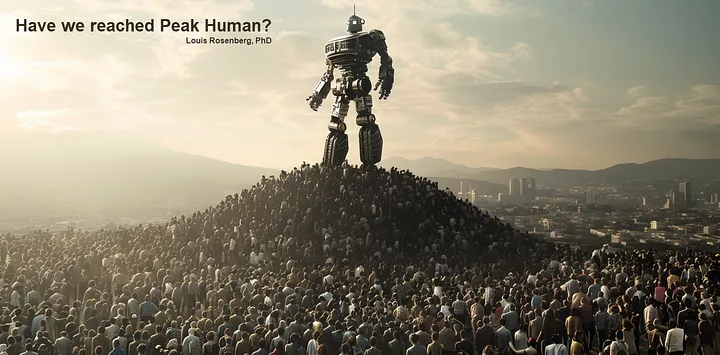I’m not talking about peak population or peak lifespan or peak performance. When I refer to Peak Human, I’m talking about whether we have reached the point where AI systems can outthink the majority of individual humans, thus defining the moment in time when we “peaked” as an intellectual force on planet earth.
After all, once we pass this milestone, we will steadily lose our cognitive edge until AI systems can outthink all individual humans — even the most brilliant among us. At that later point, we will say that AI has achieved the more dangerous milestone of Superintelligence. And while most people focus on the second milestone, I believe we should track the first because it could happen within months, not years.
Until recently, the average human could easily outperform even the most powerful AI systems when it comes to basic reasoning. There are many ways to measure reasoning, none-of-which are considered the gold standard, but the best known is the classic IQ test. A journalist named Maxim Lott has been testing Large Language Models on a standardized Mensa IQ test. Last week, for the first time, an AI model significantly beat the median human IQ of 100. The model that crossed the peak of the bell curve was Open AI’s new “o1” system — it reportedly scored 120 IQ.

So, does this mean AI has exceeded the reasoning ability of most humans?
Not so fast. It is not valid to administer a standard IQ test to an AI system because the data it trained on likely included the tests and answers. To address this, Lott had a custom IQ test created that does not appear anywhere online and therefore is not in the training data. He gave that “offline test” to Open AI’s new “o1” model and it scored an IQ of 95.

This is still an impressive result. That score beats 37% of adults on the reasoning tasks. It also represents a rapid increase, as Open AI’s prior model GPT 4, released just last year, was outperformed by 98% of adults on the same test. At this rate of progress, it is very likely that an AI model will be able to beat 50% of adult humans on standard IQ tests this year.
I know this upsets people and there is “gut reaction” to push back on this view and point out that despite the performance of Open AI’s new o1 model on logic and reasoning tests, it still makes dumb mistakes at times. That’s true, but so do most humans. Probably all humans. I also hear people say that LLMs use “pattern matching” and “memorization” to solve many problems. Again, very true, but so do humans.
Does this mean we will reach Peak Human in 2024? Yes and no.
First, I predict yes, at least one foundational AI model will be released in 2024 that can outthink more than 50% of adult humans on pure reasoning tasks. From this perspective, we will exceed my definition for Peak Human and will be on a downward path towards the rapidly approaching day when an AI is released that can outperform all individual humans, period.
Second, I say no so fast, because we humans have another trick up our sleeves. It’s called collective intelligence, and it relates to the fact that human groups can be smarter than individuals. And we humans have a lot of individuals — over 8 billion at the moment.
I bring this up because my personal focus as an AI researcher over the last decade has been the use of AI to connect groups of humans together into real-time systems that amplify our collective intelligence to superhuman levels. I call this goal Collective Superintelligence and I believe it is a viable pathway for keeping humanity cognitively competitive even after AI systems can outperform the reasoning ability of every individual among us. I like to think of this as “Peak Humanity,” and I am confident we can push it to intelligence levels that will surprise us all.
Back in 2019, my research team at Unanimous AI conducted our first experiments in which we enabled groups of people to take IQ tests together by forming real-time systems mediated by Ai algorithms. This first-generation technology called Swarm AI enabled small groups of 6 to 10 randomly selected participants (who averaged 100 IQ) to amplify their collective performance to a collective IQ score of 114 when deliberating as an AI facilitated system (Willcox & Rosenberg). This was a good start, but not within striking distance of Collective Superintelligence.
More recently we unveiled a new technology called Conversational Swarm Intelligence (CSI). It enables large groups (up to 400 people) to hold real-time conversational deliberations that amplify the group’s collective intelligence. In collaboration with Carnegie Mellon University, we conducted a 2024 study in which groups of 35 randomly selected people were tasked with taking IQ test questions together in real-time as AI-facilitated “conversational swarms” using a new CSI-powered online collaboration environment to called Thinkscape. When taking the test using this online CSI platform, the groups averaged IQ scores of 128 (the 97th percentile). This is a strong result, but I believe we are just scratching the surface of how smart humans can become when we use AI to connect human groups together in larger and larger numbers.

I am passionate about pursuing Collective Superintelligence because it has the potential to greatly amplify humanity’s cognitive abilities, and unlike a digital superintelligence it is inherently instilled with human values, morals, sensibilities, and interests. Of course, this begs the question — how long can we stay ahead of the purely digital AI systems? That depends on whether AI continues to advance at an accelerating pace or if we hit a plateau. Either way, amplifying our collective intelligence might help us maintain our edge long enough to figure out how to protect ourselves from being outmatched.
When I raise the issue of Peak Human, many people point out that human intelligence is far more than just the reasoning measured by IQ tests. I fully agree with this, but when we look deeper at some of the most “human” of all qualities — like creativity and artistry, we see evidence that AI systems are catching up with us just as quickly. It was only a few years ago that virtually all artwork created on planet earth was crafted by us humans. A recent analysis estimates that Generative AI is producing 15 billion images per year and that rate is accelerating.
Even more surprising, a study published just last week showed that AI Chatbots can outperform humans on creativity tests. To quote the paper, “the results suggest that AI has reached at least the same level, or even surpassed, the average human’s ability to generate ideas in the most typical test of creative thinking (AUT).” I’m not sure I fully believe this result, but it’s just a matter of time before it holds true.
Whether we like it or not, our evolutionary position as the smartest and most creative brains on planet earth is likely to be challenged in the very near future. We can debate whether this will be a net positive or a net negative for humanity, but either way — we need to be doing more to protect ourselves from being outmatched.


